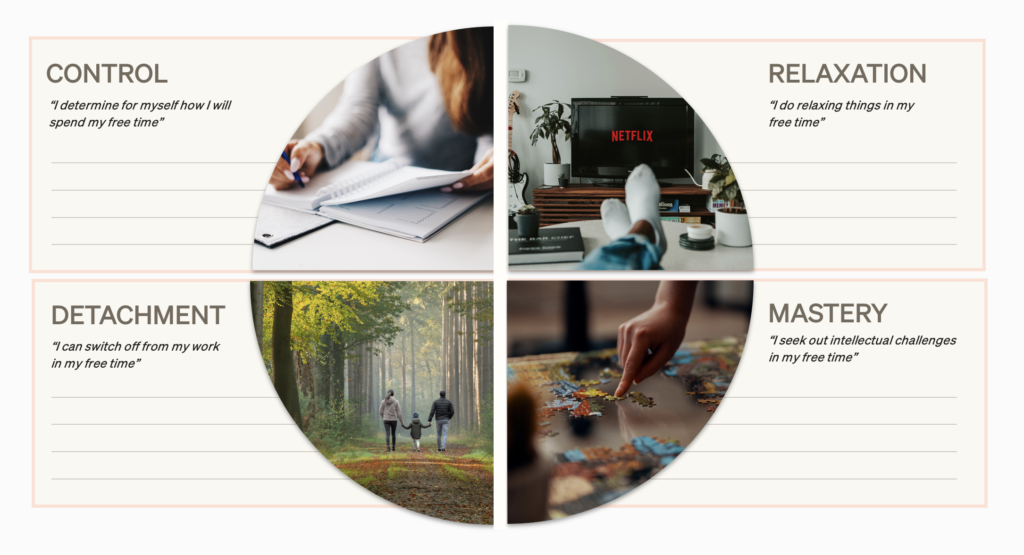The 4 Elements of Mental Recovery: Quieting a Buzzing Brain After the Workday

Sleep is not the only time our brain unwinds. We also need recovery. But what is recovery, and how can we practically make it happen? Read more about the 4 elements of mental recovery.
“Mommy, that’s not how the book goes! The bunny says much more!” My 6-year-old’s objections catch me off guard, but I don’t correct her. She’s right. I’ve been skipping parts of her bedtime story. To my utter embarrassment (even writing this now makes me feel ashamed) I realise why: I feel an urge to speed up my kids’ bedtime story to go check my work email.
For as long as I can remember, I’ve struggled to detach. After the workday has ended, my brain keeps buzzing with tasks, priorities, schedules, unwritten emails. I know that being “always on” is unproductive and gets in the way of my recovery. Yet, for the longest time, I felt unable to do much about it. Until I found one framework that made me go “Ahaa!” This framework, the 4 elements of mental recovery, is the focus of this post: What is recovery, and how can we practically make it happen?
The importance of recovery
Over the past decade, popular science has been touting the importance of sleep. Arianna Huffington dubbed herself a ”sleep evangelist”, sleep researcher Matthew Walker achieved near-celebrity status, and executives keep asking Hintsa for ”The Lewis Hamilton Jetlag Plan”. Sleep is crucial for health, performance, longevity, … you name it. But sleep is not the only time our brain unwinds. We also need recovery.
Recovery is your mind’s ability to unwind, restore your resources, and get up and perform again tomorrow. Just like physical exercise requires a balance of training and rest, our brain works and develops best when we balance performance and recovery. Recovery can occur during the workday, after the workday, and during extended time off (weekends, holidays, sabbaticals) – and it needs to occur daily, weekly, and long term.
Mental recovery is especially important for knowledge workers – those of us who work primarily with our brain. Better recovery has been associated with, e.g., lower fatigue, lower stress, better work activation, more proactive initiative and learning at work, higher psychological wellbeing, and happiness.
The 4 elements of mental recovery
So what is mental recovery? In academic research, mental recovery has four distinct elements: Relaxation, Mastery, Downtime, and Control. All four are required for high quality recovery.
Relaxation
Relaxation is what most would associate with recovery – kicking back and doing calming things. Crashing on the couch to watch Netflix, going to the spa, reading a book, meditating, taking a mindful walk. It can be measured with agreement to statements like “I do relaxing things in my free time”.
Just doing a relaxing activity is not enough though, it needs to feel relaxing. I’m a big reader and have always devoured both fiction and business books. A few years ago, however, I noticed that reading business books did not relax me anymore – it was too close to my work. So nowadays when I read a business book I firmly count it as ’work’. Relaxation doesn’t happen until I tune into a psychological thriller with a juicy who-dunnit twist.
Relaxation alone, however, tends to be passive recovery. That’s where the next element comes in.
Mastery
Mastery is a more active form of recovery. Mastery is something that engages your mind intellectually outside of work, like painting, taking photographs, playing an instrument, building model airplanes, playing chess. It’s measured with statements like “I seek out intellectual challenges in my free time”. Ideally, mastery is an activity that engages both your body and brain. Listening to music is good, playing an instrument is better. Going to a museum is good, splashing oil on canvas is better.
If you can’t immediately think of a personal mastery activity, go back to your childhood: what activities did you enjoy as a kid? Did you build lego, play board games, draw? I loved jigsaw puzzles, and it’s still one of my favorite autumn evening activities. When you’re searching through 2,000 pieces for that one exactly right hue of light blue sky, what else is there to focus on?
Detachment
The third element is detachment: your mind’s ability to refrain from work-related thoughts in your free time. Detachment is measured with statements like “I distance myself from my work in my free time”. This is my stumbling block. I was confronted with it again recently at a 2+ hour spa treatment with my mom. The spa therapist was not a talker, I could not read, and I found myself staring at the ceiling listening to whale sounds for the full treatment. I realised two things. One: scarily, I am never, ever without cognitive stimulation. Phone, podcasts, music, reading, kids – something’s always there. Being deprived of that stimulation opens the floodgates for work rumination. Two: It took me a full hour to quieten the buzz in my head and unwind.
This is what happens to many of us. Say you work a normal 8-hour day, but after you come home you keep checking your email or ruminating over work. That extends your workday and doesn’t allow your brain the detachment it needs. Importantly, you should make detachment a ritual. How do you, very practically, switch from work to home mode? Here’s my ritual: when I get home after work, I pause with my key in the front door. I think: ”Who is the person I want to be behind this door? Do I want to be the stressed, irritated mother, or do I want to be present for dinner and bedtime?” Of course, this does not mean I’m never stressed or snappy at home, but the micro-moment when I force myself to visualise the shift from work-me to home-me, helps me be a slightly better person.
Control
The fourth and final element of mental recovery is control: knowing what matters to you and being able to dedicate your time to it. During Covid, this is where many of our clients had epiphanies. One of our Formula 1 drivers said: ”Lockdown was probably the first time in my life that I was more of a father than an F1 driver – and that was a good thing”.
Personally, when we started dating, I went along with my ultra-extroverted husband-to-be’s preferred activities: parties, meeting people, activity upon activity. Until I realised I enjoyed it but it also drained me: come Monday, I would feel relieved to immerse myself in solitary work. For me ”control” is accepting that the free time I need is outright boring: sitting in silence reading, coffee cup in hand. Control is resisting the urge to get up and do something ”useful” or ”active” because others (or in many cases, me) expect me to. Control is knowing what recovery is for me, and then doing it.
What can you take away from this?
I warmly recommend going over the four elements and:
1. Assess where you stand now – what’s your strength and weakness?
2. Identify one personal routine for each of the four elements. And then do one of them in the next 24 hours (otherwise, I’m sorry to say, you are highly unlikely to act on it).

Having said all this about recovery, I also love the side of me that keeps mulling over work in my free time. At its best, that quiet murmur feeds my creativity, helps me structure problems, and feels oh so rewarding. But is it worth skipping over bunny’s lines in my kids’ bedtime story? Does the siren call of work email feed my creativity? Absolutely not.
Because I know that the tranquil moments I spend immersed in 2,000 pieces of blue sky, doing my best impression of a bunny voice, and trying to enjoy whale sounds at the spa, are the moments that not only bring happiness, but allow me to get fully immersed in the next thorny work problem thrown at me again tomorrow.



